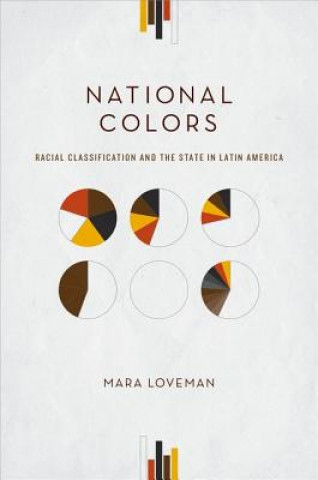
Kód: 04532175
National Colors
Autor Mara Loveman
The era of official color-blindness in Latin America has come to an end. For the first time in decades, nearly every state in Latin America now asks their citizens to identify their race or ethnicity on the national census. Most o ... celý popis
- Jazyk:
 Angličtina
Angličtina - Vazba: Pevná
- Počet stran: 400
Nakladatelství: Oxford University Press Inc, 2014
- Více informací o knize

Mohlo by se vám také líbit
-

Ford Madox Ford
2667 Kč -

On the Study Methods of Our Time
976 Kč
Dárkový poukaz: Radost zaručena
- Darujte poukaz v libovolné hodnotě a my se postaráme o zbytek.
- Poukaz se vztahuje na celou naši nabídku.
- Elektronický poukaz vytisknete z e-mailu a můžete ihned darovat.
- Platnost poukazu je 12 měsíců od data vystavení.
Více informací o knize National Colors
Nákupem získáte 544 bodů
 Anotace knihy
Anotace knihy
The era of official color-blindness in Latin America has come to an end. For the first time in decades, nearly every state in Latin America now asks their citizens to identify their race or ethnicity on the national census. Most observers approvingly highlight the historic novelty of these reforms, but National Colors shows that official racial classification of citizens has a long history in Latin America. Through a comprehensive analysis of the politics and practice of official ethnoracial classification in the censuses of nineteen Latin American states across nearly two centuries, this book explains why most Latin American states classified their citizens by race on early national censuses, why they stopped the practice of official racial classification around mid-twentieth century, and why they reintroduced ethnoracial classification on national censuses at the dawn of the twenty-first century. Beyond domestic political struggles, the analysis reveals that the ways that Latin American states classified their populations from the mid-nineteenth century onward responded to changes in international criteria for how to construct a modern nation and promote national development. As prevailing international understandings of what made a political and cultural community a modern nation changed, so too did the ways that Latin American census officials depicted diversity within national populations. The way census officials described populations in official statistics, in turn, shaped how policymakers viewed national populations and informed their prescriptions for national development-with consequences that still reverberate in contemporary political struggles for recognition, rights, and redress for ethnoracially marginalized populations in today's Latin America. "While Loveman is not the only scholar paying attention to governmental census taking, this book stands out for its theoretical depth, the remarkable mastery of historical context and agency, and its long-term historical breath. Loveman shows that rather than reflecting domestic politics or specific demographic configurations, Latin American states collected data on the kind of racial or ethnic categories that they thought would help document, to a global audience of other states, their efforts and achievements in becoming modern nations." -Andreas Wimmer, Hughes-Rogers Professor of Sociology, Princeton University
 Parametry knihy
Parametry knihy
Zařazení knihy Knihy v angličtině Society & social sciences Society & culture: general Social groups
5443 Kč
- Plný název: National Colors
- Podnázev: Racial Classification and the State in Latin America
- Autor: Mara Loveman
- Jazyk:
 Angličtina
Angličtina - Vazba: Pevná
- Počet stran: 400
- EAN: 9780199337354
- ISBN: 0199337357
- ID: 04532175
- Nakladatelství: Oxford University Press Inc
- Hmotnost: 796 g
- Rozměry: 237 × 162 × 30 mm
- Datum vydání: 24. July 2014
Oblíbené z jiného soudku
-

Women Who Run with the Wolves
238 Kč -

Freedom Writers Diary
287 Kč -

Think Like a Monk
441 Kč -

Orientalism
306 Kč -

How Europe Underdeveloped Africa
515 Kč -

Desert Flower
286 Kč -

Why Does He Do That?
399 Kč -

Letters to a Young Muslim
303 Kč -

Eros and Mysteries of Love
426 Kč -

Life After Darkness
520 Kč -

Puer Tea
772 Kč -

Womanhood
544 Kč -

Complete Book of Pilates for Men
447 Kč -

JFK - 9/11
740 Kč -

Sword of No-sword
646 Kč -

Gypsy Identities 1500-2000
1641 Kč -

Colloquial Yiddish
1682 Kč -

Servitors of Empire
493 Kč -

Gerotranscendence
3473 Kč -

Northwest Coast Indian Art
721 Kč -

Qur'an
810 Kč -

When God Was A Woman
496 Kč -

The Mastery of Love
309 Kč -

Vintage Menswear
435 Kč -

Who Cooked the Last Supper?
427 Kč -

Women Who Run With The Wolves
410 Kč -

The Way of Men
334 Kč -

The Autobiography of Malcolm X
225 Kč -

Second Sex
410 Kč -

Goddesses in Everywoman
303 Kč -

Talking with Female Serial Killers - A chilling study of the most evil women in the world
276 Kč -

Intellectuals and Society
538 Kč -

Women in the Qur'an
493 Kč -

Erotic Bondage Book
367 Kč -

Zami
276 Kč -

Nine Years among the Indians, 1870-1879
618 Kč -

Dark Emu
410 Kč -

Childhood and Society
394 Kč -

Happy City
303 Kč -

The Male Nude
481 Kč -

The Bell Curve
464 Kč -

We Should All Be Feminists
213 Kč -

Empire of the Summer Moon
357 Kč -

Radium Girls
276 Kč -

Dance of Anger
276 Kč -

Beauty Myth
357 Kč -

Muqaddimah
543 Kč -

TROUBLEMAKER
363 Kč -

Ladies' Book of Etiquette and Manual of Politeness
306 Kč
Osobní odběr Praha, Brno a 12903 dalších
Copyright ©2008-24 nejlevnejsi-knihy.cz Všechna práva vyhrazenaSoukromíCookies



 Vrácení do měsíce
Vrácení do měsíce 571 999 099 (8-15.30h)
571 999 099 (8-15.30h)